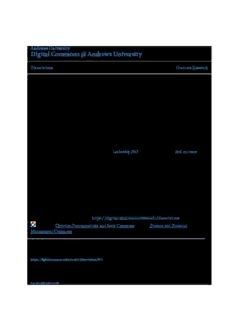Table Of ContentAAnnddrreewwss UUnniivveerrssiittyy
DDiiggiittaall CCoommmmoonnss @@ AAnnddrreewwss UUnniivveerrssiittyy
Dissertations Graduate Research
2014
AAnn EExxpplloorraattoorryy,, CCoorrrreellaattiioonnaall,, SSeellff--RRaatteerr SSttuuddyy oonn AAuutthheennttiicc
LLeeaaddeerrsshhiipp VVaalluueess ooff AAddvveennttiisstt LLooccaall CCoonnffeerreennccee CChhiieeff FFiinnaanncciiaall
OOffifficceerrss iinn tthhee UUnniitteedd SSttaatteess
Juan R. Prestol-Pues{acute}an
Andrews University
Follow this and additional works at: https://digitalcommons.andrews.edu/dissertations
Part of the Christian Denominations and Sects Commons, and the Finance and Financial Management
Commons
RReeccoommmmeennddeedd CCiittaattiioonn
Prestol-Pues{acute}an, Juan R., "An Exploratory, Correlational, Self-Rater Study on Authentic Leadership
Values of Adventist Local Conference Chief Financial Officers in the United States" (2014). Dissertations.
641.
https://digitalcommons.andrews.edu/dissertations/641
This Dissertation is brought to you for free and open access by the Graduate Research at Digital Commons @
Andrews University. It has been accepted for inclusion in Dissertations by an authorized administrator of Digital
Commons @ Andrews University. For more information, please contact [email protected].
Thank you for your interest in the
Andrews University Digital Library
of Dissertations and Theses
.
Please honor the copyright of this document by
not duplicating or distributing additional copies
in any form without the author’s express written
permission. Thanks for your cooperation.
ABSTRACT
AN EXPLORATORY, CORRELATIONAL, SELF-RATER STUDY
ON AUTHENTIC LEADERSHIP VALUES OF ADVENTIST
LOCAL CONFERENCE CHIEF FINANCIAL
OFFICERS IN THE UNITED STATES
by
Juan R. Prestol-Puesán
Chair: Erich Baumgartner
ABSTRACT OF GRADUATE STUDENT RESEARCH
Dissertation
Andrews University
School of Education
Title: AN EXPLORATORY, CORRELATIONAL, SELF-RATER STUDY ON
AUTHENTIC LEADERSHIP VALUES OF ADVENTIST LOCAL
CONFERENCE CHIEF FINANCIAL OFFICERS IN THE UNITED STATES
Name of researcher: Juan R. Prestol-Puesán
Name and degree of faculty chair: Erich Baumgartner, Ph.D.
Date completed: November 2014
The Problem
Seventh-day Adventist (SDA) local conference treasurers, or Chief Financial
Officers, are trusted by church members to manage the finances of the church and
provide financial leadership, yet the denomination does not know how treasurers develop
their values and leadership capacity as financial administrators. This study examined how
treasurers compare with the leadership values of morality, integrity, and fairness
prevalent today in positive forms of leadership theories. It explores SDA treasurer or
financial officer self-assessment with the rating that their team members provide,
allowing us to know the authenticity of their values as leaders.
Method
This is a census of a population composed of 50 local conference treasurers,
leaders, and 148 followers composed of associates in treasury work and academy
treasurers. The participants responded to the Authentic Leadership Questionnaire 1.0
online. Their responses allowed us to know how treasurers see themselves, and how their
followers see them. The instrument tested both groups in four dimensions: (a) Relational
Transparency, (b) Balanced Processing of Opinions, (c) Ethical/Moral Values, and (d)
Self-Awareness, and their responses were processed anonymously online by Mind
Garden, Inc. The aggregate responses were analyzed in SPSS.
Conclusions
The results indicate that the self-perceptions of the leaders are significantly higher
than the perceptions reported by their followers. The follower group of associates in
treasury consistently gave lower means (µ) than did the academy treasurers. The role
played by the participants in the study (local conference treasurers, associates in treasury,
and academy treasurers) was significantly related to the responses they provided. The
leaders’ personal characteristics are significantly related to their own self-perception
about authentic leadership, and followers’ personal characteristics are also significantly
related to how they perceive the authenticity of their leaders. Beta (β) coefficients of
treasurers’ personal characteristics indicate that the longer they work for the
denomination, the less authentic they are as leaders. The longer followers work for the
denomination, the less they believe in their leaders as authentic leaders.
The disagreement in the perceptions of leaders and followers may be an indication
of a disconnect, possibly a degree of discomfort, distrust, skepticism or dissatisfaction
made evident by the lower statistical means of the followers. This erosion of influence
points to issues of power, authority, and leadership within the Adventist church structure.
Conference treasurers may not be fulfilling their leadership role appropriately.
Andrews University
School of Education
AN EXPLORATORY, CORRELATIONAL, SELF-RATER STUDY
ON AUTHENTIC LEADERSHIP VALUES OF ADVENTIST
LOCAL CONFERENCE CHIEF FINANCIAL
OFFICERS IN THE UNITED STATES
A Dissertation
Presented in Partial Fulfillment
of the Requirements for the Degree
Doctor of Philosophy
by
Juan R. Prestol-Puesán
November 2014
© Copyright by Juan R. Prestol-Puesán 2014
All Rights Reserved
AN EXPLORATORY, CORRELATIONAL, SELF-RATER STUDY
ON AUTHENTIC LEADERSHIP VALUES OF ADVENTIST
LOCAL CONFERENCE CHIEF FINANCIAL
OFFICERS IN THE UNITED STATES
A dissertation
presented in partial fulfillment
of the requirements for the degree
Doctor of Philosophy
by
Juan R. Prestol-Puesán
APPROVAL BY THE COMMITTEE:
_________________________________ ______________________________
Chair: Erich Baumgartner, Ph.D. Dean, School of Education
James R. Jeffery
_________________________________
Member: Tevni Grajales, Ph.D.
_________________________________
Member: Ann Gibson, Ph.D.
_________________________________ ______________________________
External: Theodore Brown, Sr., Ph.D. Date approved
TABLE OF CONTENTS
LIST OF TABLES ...................................................................................................... vi
LIST OF FIGURES .................................................................................................... vii
Chapter
1. OVERVIEW OF THE STUDY ................................................................................. 1
Background ............................................................................................... 1
Paulsen’s Statements on Leadership ......................................................... 4
Context of the Study ................................................................................. 5
Statement of the Problem .......................................................................... 8
Purpose of the Study ................................................................................. 9
Research Questions ................................................................................... 9
Research Question 1 ........................................................................... 9
Research Question 2 ........................................................................... 9
Research Question 3 ........................................................................... 10
Research Hypotheses ................................................................................ 10
Hypothesis 1........................................................................................ 10
Hypothesis 2........................................................................................ 10
Hypothesis 3........................................................................................ 10
Methodology ............................................................................................. 11
Conceptual Framework ............................................................................. 12
Significance of the Study .......................................................................... 13
Assumptions .............................................................................................. 13
Limitations of the Study............................................................................ 14
Delimitations ............................................................................................. 14
Definition of Terms................................................................................... 14
Overview of the Study .............................................................................. 17
2. REVIEW OF THE LITERATURE ........................................................................... 18
Introduction ............................................................................................... 18
Brief Historical Overview of Authentic Leadership ................................. 18
The Approach of This Study ............................................................... 21
A New Awareness in Society ............................................................. 22
The Quest for Authenticity ................................................................. 24
The Positive Approach to Leadership ................................................. 25
Philosophical and Theoretical Foundations of Authentic
Leadership ........................................................................................... 28
A Post-Analytic View ......................................................................... 28
iii
Description:Officers, are trusted by church members to manage the finances of the church and provide financial leadership, yet the denomination does not know how treasurers develop their values and leadership capacity as financial administrators. This study examined how treasurers compare with the leadership

